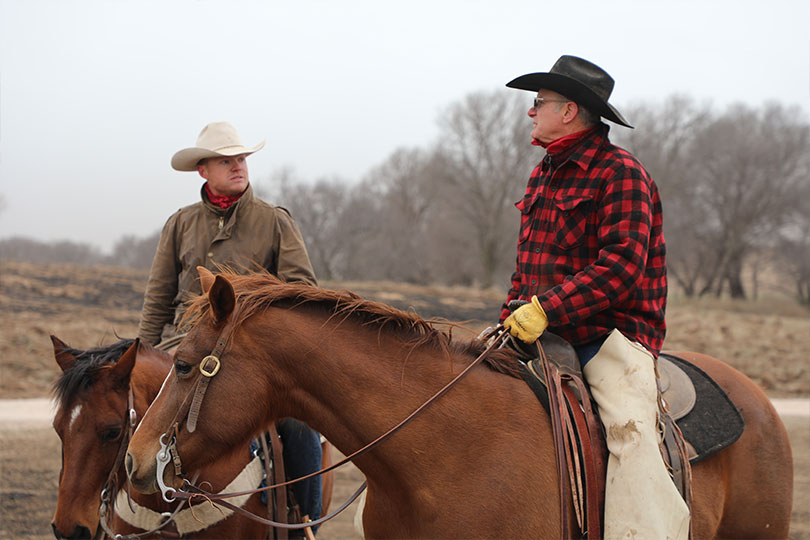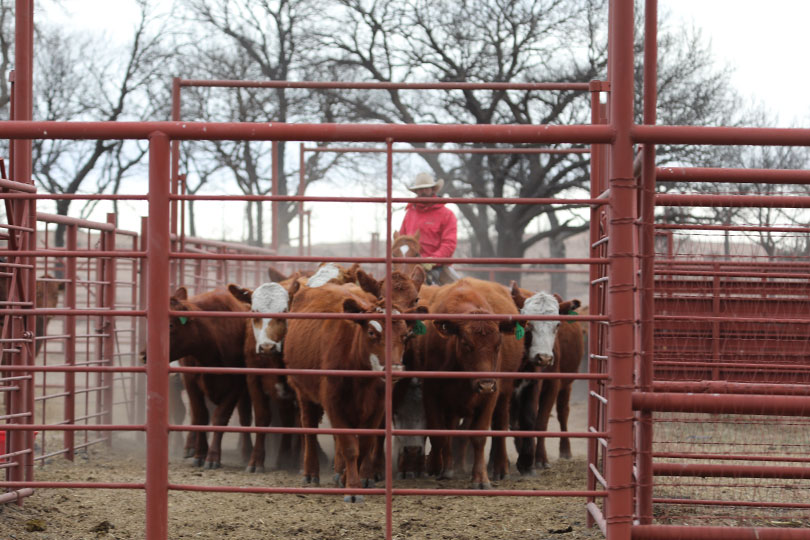By Shelby Shank
Field Editor
It all started with a call no rancher wants to get from a loved one.
As fires broke out in Lefors, John Haley and his uncle Jeff, fought tirelessly throughout the night to contain the blaze at Jeff’s ranch.
Then, John got the call from his wife in Canadian. She urged him to come home to start preparing to evacuate.
“The fire progressively kept working its way north. Jeff was still tending the fire in Lefors and said it’s probably time to start making preparation to get cattle congregated,” John said. “And I’m glad he did.”
Several wildfires broke out across the Texas Panhandle, fueled by a dangerous combination of high winds, drought and above-normal temperatures.
“We had great response from a lot of the other departments controlling the fire in Lefors until the Smokehouse Creek Fire broke out,” Jeff said. “We had to move our resources around to protect cities. At that point, all the crews were stretched thin. There just wasn’t enough manpower.”
The Smokehouse Creek Fire started north of Stinnett in Hutchinson County and moved east along the Canadian River into Roberts and Hemphill counties. The winds shifted, moving the fire south, engulfing the town of Canadian.
According to the Texas A&M Forest Service, the fire has burned over 1 million acres and is still not contained.
The fire’s relentless pursuit forced many to evacuate, including John’s family.
“My wife made the move with our two young children,” John said. “With Highway 83 blocked off due to the fires, she made the call to take back roads out of Canadian and head to Elk City, Oklahoma, as the fire closed in.”

Meanwhile, John made the decision to stay behind at the ranch where he and the ranch crew quickly moved cattle to a wheat field behind the house.
“We made the best decision we could at the time. We had a tractor with a disc on it that we ran to tear up the ground and save our headquarters,” John said. “I make the joke that farming saved our lives with the disc and wheat field, because without it, I don’t think our headquarters would be here.”
As the Haleys assess the damage to their ranches, Jeff estimates losses of about 25-30% of the ranch in Lefors and all of their 10,000 acres in Canadian burned.
“We’re still assessing our livestock losses and trying to get counts,” John said. “One of our biggest losses here were our saddle horses. We rest some of horses in a different pasture, and I’m waiting on the vet to get out here to help me assess, but it doesn’t look very good.”
Despite the devastation, the Haleys are fortunate to still have cattle and have moved them to other leased pastures.
“We were keeping it for summer pasture, which we’re grateful to have and that it didn’t burn,” John said. “We’re moving cattle off this black, scorched ground and getting them somewhere cleaner. We’re still a little bit worried because we’re not out of fire danger, but it’s better for the stock if we can get them off this burned ground, the smoke and dust.”
They lived and ranched through the wildfires in 2006 and 2017, which taught them to prioritize and act.
“Your mind has to focus on the priorities,” he said. “There isn’t much time for emotion to come into play when you’re trying to manage a crisis and decide what happens next.”
The Haleys remain resilient in the face of adversity, knowing that ranching in the Panhandle requires a special toughness.
“You have to be able to take a punch,” Jeff said. “Being in the ranching business, you’re subjected to Mother Nature. Whether it’s rain, fire, wind or snow, you can’t control it. You just have to know what you can do personally and make a call knowing you’re not going to be able to change the direction of the weather. You have to be prepared for it the best you can.”
Rain is needed, but so is time. Time to heal and to rebuild what the fires destroyed.
The road to recovery will be long and difficult, but with the strength and resilience of the Panhandle community, along with donations pouring in from fellow Texans and ranchers across the country, they will rebuild and thrive once again.


Leave A Comment